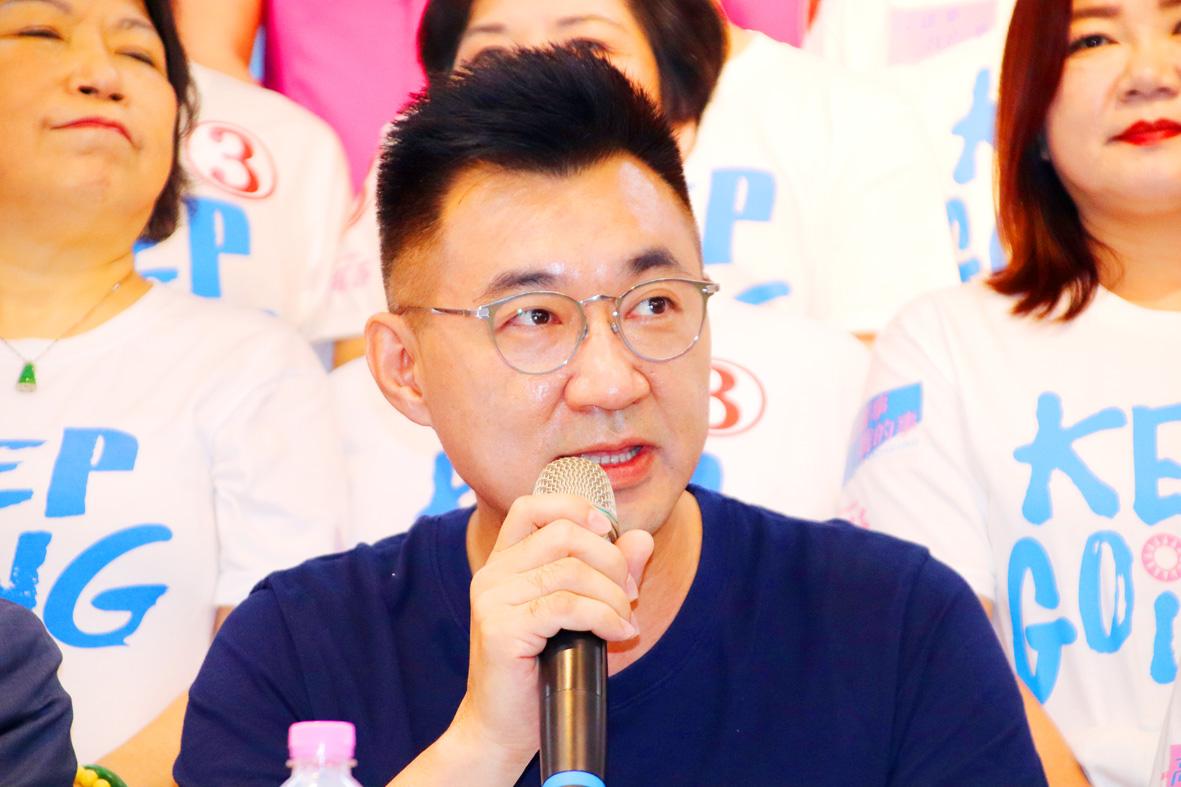Former vice premier Chen Chi-mai’s (陳其邁) landslide victory on Saturday in the Kaohsiung mayoral by-election shows troubled waters lie ahead for Chinese Nationalist Party (KMT) Chairman Johnny Chiang (江啟臣).
The Democratic Progressive Party (DPP) candidate won 671,804 votes, or 70.03 percent of the total, while KMT Kaohsiung City Councilor Jane Lee (李眉蓁) received 248,478 votes (25.90 percent) and Kaohsiung City Councilor Wu Yi-jheng (吳益政) of the Taiwan People’s Party got 38,960 votes (4.06 percent).
Chiang, who has less than a year left in his term as party chairman, has said before that the KMT had missed its chance to train talented people when the party had a hold on Kaohsiung, but was left with no good candidates ahead of the by-election.

Photo: Fang Chih-hsien, Taipei Times
Hours after the KMT announced Lee would be its by-election candidate on June 23, Chiang wrote on Facebook that the KMT should “not think about winning, but rather should think about not losing.”
While trying to appear like a commander deploying an army into battle, Chiang’s post suggested the KMT had already accepted the by-election would be a losing battle before it even began.
Within the KMT, the by-election was seen largely as an extension of the Jan. 11 presidential poll — so it is hard not to pass the buck for the loss to Chiang’s predecessor, former vice president and Kaohsiung mayor Wu Den-yih (吳敦義).
When then-Kaohsiung mayor Han Kuo-yu (韓國瑜) lost a recall election on June 6, Chiang’s supporters were already up in arms in a battle to protect the lawmaker’s leadership position.
Political watchers think former KMT chairman Eric Chu (朱立倫) is interested in regaining the party’s top seat, with an eye on the 2024 presidential election, while Han’s camp has said that he also hopes to run for party chairman next year.
In the wake of its major defeat in the Jan. 11 presidential and legislative elections, the KMT is now focused on reforms, issues related to constitutional amendments under discussion at the Legislative Yuan, and its role as an opposition party supervising President Tsai Ing-wen’s (蔡英文) government.
These will be important areas for anyone aspiring to the chairperonship to demonstrate their political strength.
Recently, the party’s Kaohsiung city councilors have lambasted Chiang and KMT Secretary-General Lee Chien-lung (李乾龍) for sticking with Lee after a scandal erupted over allegations that she had plagiarized large portions of her master’s degree thesis.
Some traveled to Taipei to voice their complaints in person at KMT headquarters; their criticism was echoed by some party members in Taipei and New Taipei City, who also expressed doubts about Chiang’s leadership abilities.
As a result, a number of party members who oppose Chiang now support the idea of Chu challenging for the leadership, reportedly including former Taipei mayor Hau Lung-bin (郝龍斌), who lost the last chairperson election to Chiang.
Some observers see Chiang’s situation akin to that faced by former KMT chairwoman Hung Hsiu-chu (洪秀柱), who also led the KMT just after a presidential election defeat, and who faced an internal power struggle.
Chiang must solidify his internal support before the end of the year, or he could become a lame duck if KMT members begin to see his chances of being re-elected are slim.
Translated by staff writer William Hetherington

Travel agencies in Taiwan are working to secure alternative flights for travelers bound for New Zealand for the Lunar New Year holiday, as Air New Zealand workers are set to strike next week. The airline said that it has confirmed that the planned industrial action by its international wide-body cabin crew would go ahead on Thursday and Friday next week. While the Auckland-based carrier pledged to take reasonable measures to mitigate the impact of the workers’ strike, an Air New Zealand flight arriving at Taipei from Auckland on Thursday and another flight departing from Taipei for Auckland on Saturday would have to

The manufacture of the remaining 28 M1A2T Abrams tanks Taiwan purchased from the US has recently been completed, and they are expected to be delivered within the next one to two months, a source said yesterday. The Ministry of National Defense is arranging cargo ships to transport the tanks to Taiwan as soon as possible, said the source, who is familiar with the matter. The estimated arrival time ranges from late this month to early next month, the source said. The 28 Abrams tanks make up the third and final batch of a total of 108 tanks, valued at about NT$40.5 billion

A group from the Taiwanese Designers in Australia association yesterday represented Taiwan at the Midsumma Pride March in Melbourne. The march, held in the St. Kilda suburb, is the city’s largest LGBTQIA+ parade and the flagship event of the annual Midsumma Festival. It attracted more than 45,000 spectators who supported the 400 groups and 10,000 marchers that participated this year, the association said. Taiwanese Designers said they organized a team to march for Taiwan this year, joining politicians, government agencies, professionals and community organizations in showing support for LGBTQIA+ people and diverse communities. As the first country in Asia to legalize same-sex

MOTIVES QUESTIONED The PLA considers Xi’s policies toward Taiwan to be driven by personal considerations rather than military assessment, the Epoch Times reports Chinese President Xi Jinping’s (習近平) latest purge of the Chinese People’s Liberation Army (PLA) leadership might have been prompted by the military’s opposition to plans of invading Taiwan, the Epoch Times said. The Chinese military opposes waging war against Taiwan by a large consensus, putting it at odds with Xi’s vision, the Falun Gong-affiliated daily said in a report on Thursday, citing anonymous sources with insight into the PLA’s inner workings. The opposition is not the opinion of a few generals, but a widely shared view among the PLA cadre, the Epoch Times cited them as saying. “Chinese forces know full well that